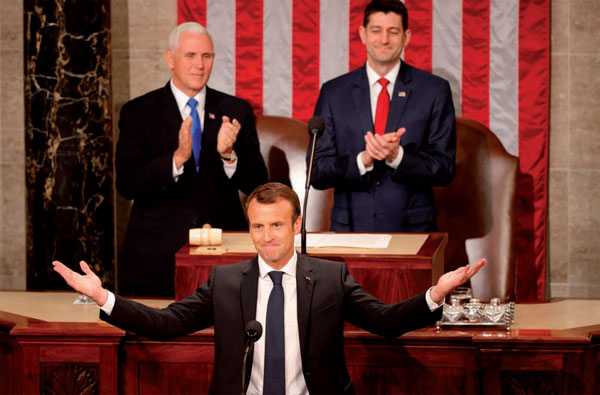Macron shows differences with Trump in address to Congress
By Ai Heping in New York (China Daily USA) Updated: 2018-04-26 10:38
On Tuesday, they kissed, hugged, held hands and slapped each other's backs.
But on Wednesday, France's President Emmanuel Macron put distance between himself and US President Donald Trump - at least on major policies - in a speech before a joint meeting of Congress in which he never mentioned Trump's name.
The touchy-feely expressions shared between the two men during Macron's three-day state visit to the US - the first foreign leader afforded one by Trump's White House - were put aside in a speech that showed their differences on trade, global warming, the Iran nuclear deal and foreign policy.
|
French President Macron addresses a joint meeting of Congress on Capitol Hill in Washington on Wednesday. Brian Snyder / Reuters |
Earlier on Wednesday, Trump tweeted that he was, "Looking forward to watching President Macron of France address a Joint Session of Congress today. This is a great honor and seldom allowed to be done...he will be GREAT!"
There was no immediate reaction from the White House to Macron's speech.
Macron was given a three-minute standing ovation before he spoke, and his remarks were met with several ovations from both Republicans and Democrats.
In a humorous nod to those embraces with the man he calls "dear Donald", Macron opened by comparing their interactions to those between the French philosopher Voltaire and Benjamin Franklin when they met in Paris in 1778.
"They embraced each other by hugging one another in their arms, and kissing each other's cheeks," he said. "It can remind you of something."
And then came the differences in his 50-minute speech.
Trade: "We need a free and fair trade for sure," Macron said, but added "a commercial war opposing allies is not consistent with our mission, with our history, with our current commitments for global security." He called for differences on trade imbalances and over capacity to be worked out through the World Trade Organization, the opposite approach to Trump's threats of tariff wars. "We wrote these rules. We should follow them," he said.
Global warming: He borrowed Trump's 2016 election theme of "Make America Great Again": "Let us work together in order to make our planet great again and create new jobs and new opportunities while safeguarding our Earth.
"I believe in building a better future for our children, which requires offering them a planet that is still habitable in 25 years," he said. "There is no planet B."
At one point, he expressed confidence that the United States would ultimately rejoin the Paris climate agreement.
Iran nuclear agreement: On Tuesday Trump described it as "insane". Macron said that he and Trump had agreed to seek a new deal on Iran's nuclear program to counter the perceived threat from Tehran's missile program, regional influence and eventual nuclear activity when the current deal expires. But he warned that the United States and France should also honor the existing pact.
"We signed it at the initiative of the United States," he said. "That is why we cannot say we should rid of it like that. France will not leave the JCPOA because we signed it." He said that "Iran shall never possess any nuclear weapons. Not now. Not in five years. Not in 10 years. Never."
Isolationism: "We can choose isolationism, withdrawal and nationalism. This is an option. It can be tempting to us as a temporary remedy to our fears," Macron said. "But closing the door to the world will not stop the evolution of the world."
He said no one should take transatlantic ties or common values for granted, warning that liberal internationalism was under siege.
"Other powers with the strongest strategy and ambition will then fill the void we would leave empty. Other powers will not hesitate once again to advocate their own model to shape the 21st century world order, Macron said.
"Personally, if you ask me, I do not share the fascination for new strong powers, the abandonment of freedom and the illusion of nationalism."
aiheping@chinadailyusa.com
(China Daily USA 04/26/2018 page2)
- 'Cooperation is complementary'
- Worldwide manhunt nets 50th fugitive
- China-Japan meet seeks cooperation
- Agency ensuring natural gas supply
- Global manhunt sees China catch its 50th fugitive
- Call for 'Red Boat Spirit' a noble goal, official says
- China 'open to world' of foreign talent
- Free trade studies agreed on as Li meets with Canadian PM Trudeau
- Emojis on austerity rules from top anti-graft authority go viral
- Xi: All aboard internet express












